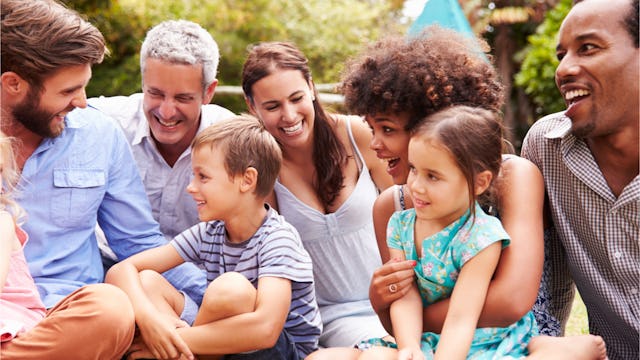The Gift Of Being Close Friends With Your Adult Siblings

Some days, I feel like my entire role as a mother is to diffuse fights between my sons. They will fight about who got a longer turn on the Xbox, who got a bigger piece of candy, whose farts smell worse. They will bicker about literally anything and everything. They scream at each other, shout hurtful things, and sometimes lash out physically. Just this morning, a sneeze by my older son (a sneeze!) sparked what seemed like WWIII in our family room.
If I didn’t know better, I might think my kids hate each other sometimes.
Fortunately, I do know better.
I know that all this nonsense is just typical sibling behavior and that deep down they have a fierce loyalty to each other. My older son looks out for his brother and defends him when necessary. My younger son basically worships the ground his older brother walks on, looking to him for guidance on everything from homework to baseball and inappropriate jokes.
Such is the way of siblings. They argue, forgive, laugh, love. Rinse and repeat.
With two siblings of my own, I understand the complexities of the sibling relationship. My sister and I would lash out at each other, verbally and physically. We taped lines down the center of our bedroom, which we shared, and literally drew blood sometimes in our fights over who knows what.
My brother was five years younger than me and was basically just a giant nuisance in the way that little brothers often are.
But.
My sister and I also stayed up late into the night talking about boys, friends, and school and have always been each other’s biggest supporter and defender. My brother started visiting me while I was in college, and we partied our way into becoming BFFs. In other words, we were siblings. And we loved each other deeply.
As annoying as my kids’ bickering is some days, it doesn’t really concern me. I care less about whether they are jolly playmates as children and more about whether they are true friends as adults. I would rather suffer through their arguments now, knowing that it is in the arguing and forgiving that they will create a bond strong enough to withstand the test of time. It is through their arguments about minor things of childhood that they learn how to interact and disagree — respectfully — about the bigger things of adulthood.
When I think about my relationships with my own siblings, it isn’t our relationship as kids that matters as much as our bond as adults. While it was fun to have a playmate as a child, it is in adulthood that I’ve really needed the support and friendship of my siblings the most.
I’m fortunate to have a close relationship with both my sister and my brother, and we’ve supported each other through some really serious shit. Sure, we disagree with each other and have different lifestyles, but we also understand each other in a fundamental way. We understand family dramas and eccentricities in a way that others cannot. We know each other’s histories and, as a result, have a glimpse into each other’s psyches. We recognize how our idiosyncrasies might have been impacted by our shared upbringing. We might not always agree, but we are, without a doubt, on the same team.
I know that not everyone can say the same. There are some people who, for a variety of reasons, might have a less-than-ideal relationship or non-relationship with their adult siblings, and it does seem to take an emotional toll on them, even if it’s the best/only choice. So I’m aware that being friends with your adult siblings is indeed a gift, and not one that I take for granted.
I appreciate my siblings now more than ever. Over the years, we’ve supported each other through miscarriages, births, job changes, marriages challenges, and the pressures of raising a family. Our dad was recently diagnosed with Alzheimer’s disease, and let me tell you, this is the kind of thing that makes or breaks a relationship. We’ve given each other the space to deal with the diagnosis and its practical effects in our own way, but there is also an understanding that we are in this together and will help each other, and our mom, through this difficult journey.
I could say I’m “lucky,” but luck is only part of the equation. An intentional effort to stay close and maintain a healthy relationship is also a big part of it. It means finding the time — and yes, you need find the time because it isn’t just going to drop out of the sky — to talk and connect. It means biting your tongue sometimes. It means listening and finding common ground. It means celebrating our shared family history while respecting the new families we are building. It means showing up for each other. And just like when we were kids and bickered about this or that, it also means forgiving each other.
When I see my children playing together or hear them laughing together late at night when they should be sleeping, it makes my heart swell to almost uncontainable dimensions. It is the closest thing to magic that I know. Even though their bickering drives me to distraction — and yelling — some days, what I really want isn’t necessarily for them to have a conflict-free relationship as children, but a strong friendship as adults. And I will do whatever it takes to encourage that because it is truly a gift.
This article was originally published on